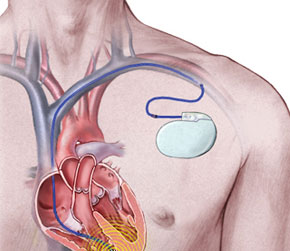Pacemaker Defibrillator
Many people think that a pacemaker and a defibrillator are the same device. In fact, they are different. One is used to constantly keep the heart beating, while the other’s main function is to only step in when there is a life threatening issue. While it is similar to a pacemaker in how it looks and how it is inserted, an implantable defibrillator’s function is much different. At any rate, many people call this type of defibrillator a pacemaker defibrillator. This is acceptable, as long as it is clear what each does. Before understanding a pacemaker defibrillator, defibrillators or pacemakers, it is important to understand how the heart works in a general way. This will allow for a better understanding of the two devices designed to help the heart function properly.
The Heart and a Pacemaker Defibrillator
The heart is the most important of all the parts of our body. Without it, none of the other tissues and cells of our body would get the nutrients they need and we would die almost instantly. This is in sharp contrast to other parts, like the leg, which can be amputated. The heart cannot be amputated! The heart works by pumping the blood around the body and will beat over 2 billion times in an average person’s lifetime. That is a lot of beating! Because it needs to do so much work, it is important that it be a strong muscle. But the strongest of muscles can only last so long. It is important that as the heart ages, care is taken to make sure it continues to function. This is particularly important in older individuals.
When the heart starts to wear out, for any number of reasons, it becomes important for doctors to take steps to prevent cardiac failure. These may include a heart transplant, bypass surgery, a pacemaker, a defibrillator, et al. There are many options, each designed to treat a certain defect with the heart. The pacemaker defibrillator (or implantable defibrillator) is used when the heart is susceptible to failure. The defibrillator will “shock” the heart back to life. This is an oversimplification, but it is accurate nonetheless.
Deciding on a Pacemaker Defibrillator
Has your doctor told you that a pacemaker defibrillator is right for you? Are you a little hesitant about having a device like this inserted into your chest? These are common questions and very important ones. You should talk to your doctor about what is right for you or your loved one. Don’t make the mistake of blindly listening to your doctor, but also don’t automatically shoot down the idea. Getting a pacemaker defibrillator could potentially save your life, so take careful consideration before deciding. In the meantime, understand that the point when a pacemaker defibrillator is needed is when heart disease has already happened. This should be a wake-up call to take care of yourself or family member by eating right, following the doctor’s instructions and spending your time wisely. You may be able to extend your life by using a pacemaker defibrillator, but this is a choice for you and your family to make!

